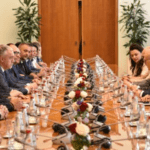The assassination attempt on Slovakia’s populist prime minister last month has highlighted divisions in central Europe, a region that has become particularly polarized since the start of Russian aggression in Ukraine. Meanwhile, as Voice of America correspondent Ricardo Marquina reports, Russia has increased its propaganda campaign.
Slovakian Prime Minister Robert Fico addressed the nation in a social media message recorded at his home after being released from hospital where he received medical treatment after being shot several times. Mr Fico believes the attack was due to his views against support for Ukraine.
Drawing on polling data, analysts say the polarization between those who support Ukraine and those who side with Russia has grown exponentially. This is not only observed on the streets of Slovakia, but in societies throughout Central Europe.
A report, from the Slovak organization ‘GLOBASEC’, says that the prolongation of the war is the reason for the decrease in support for Ukraine in these countries.
“What has happened is the decline of the support that existed at the beginning, in 2022. For example, in Poland, compared to 2022, fewer people see the future of Ukraine in the EU, NATO or both,” he says one of the report’s co-authors, Patrik Szichrle, from the Center for Democracy, told VOA.
“These disinformation campaigns are not really intended to win the hearts of Eastern Europeans, but to confuse them, to make them believe that the West is not so good,” Dorka Takscy from the German Marshall Fund told VOA.
Analysts say that along with the growth of propaganda campaigns on social media, Russia is constantly working to penetrate the institutions not only of Central European countries, but also of Western Europe. Suspected Russian spies have recently been arrested in Germany.
“We see what appears to be an activation of Russia’s programs to extend the influence of its intelligence and security services potentially to prepare for conflict with Europe,” Keir Giles of Chatham House told VOA. center in London.
From Riga to Bratislava, the former communist countries of Eastern and Central Europe, once within Moscow’s sphere of influence, face increasing pressures that are straining their societies. This pressure is raising concerns about the future of democracy in the region./VOA/







